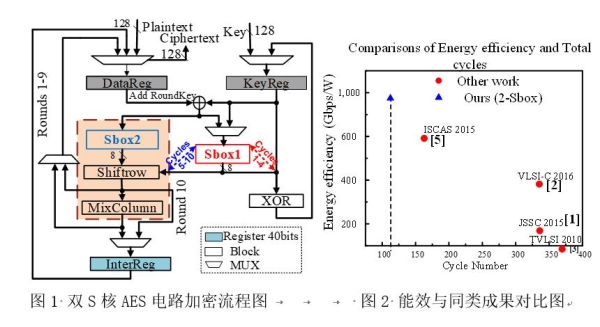
From June 9 to 14, Professor Shan Weiwei and Professor Yang Jun, etc. from the School of Electronic Science and Engineering attended the Symposia VLSI Technology and Circuits Conference held in Japan. Professor Shan Weiwei gave a reportat C20 session, the parallel session of the Symposium on VLSI Circuits with the theme of “A 923Gbps/W, 113-Cycle, 2-Sbox Energy-efficient AES Accelerator in 28nm CMOS”, which witnesses an important breakthrough of Southeast University at this conference.
For the demand of ultra-low power dissipation and security regarding the Internet of Things, the paper designs an ultra-efficient Advanced Encryption Standard (AES) encryption circuit that highlights small area and low power dissipation for lightweight applications. The paper reduces the power dissipation and area by changing the data path from 128-bit parallel processing to 8-bit serial processing. Meanwhile, considering the problem of lower throughput of 8-bit AES circuit, a dual S-core implementation is proposed, in which one S-core is used for data encryption with the first four cycles of the other S-core used for key generation, afterwards paralleled with the first S-core for data encryption, as shown in Fig. 1. Therefore, this paper implements 11 cycles for key expansion and data processing modules, and gives full play to the paralleled execution of these two S-cores so as to achieve AES encryption in only 113 cycles.
This circuit is taped out by TSMC 28nm CMOS process. The test results show that the energy efficiency of the AES circuit hereof reaches 923Gbps/W, which is the highest energy efficiency up to now, obviously superior than similar research results.
The VLSI International Symposium began in 1987 as the world's leading conference on advanced semiconductors and integrated circuits. It is divided into two major sessions: the Symposium on VLSI Technology and the Symposium on VLSI Circuits respectively. This international conference is convened every summer and deemed as one of two flagship conferences in the field of integrated circuits with the International Solid State Circuits Conference (ISSCC) that is held every winter.